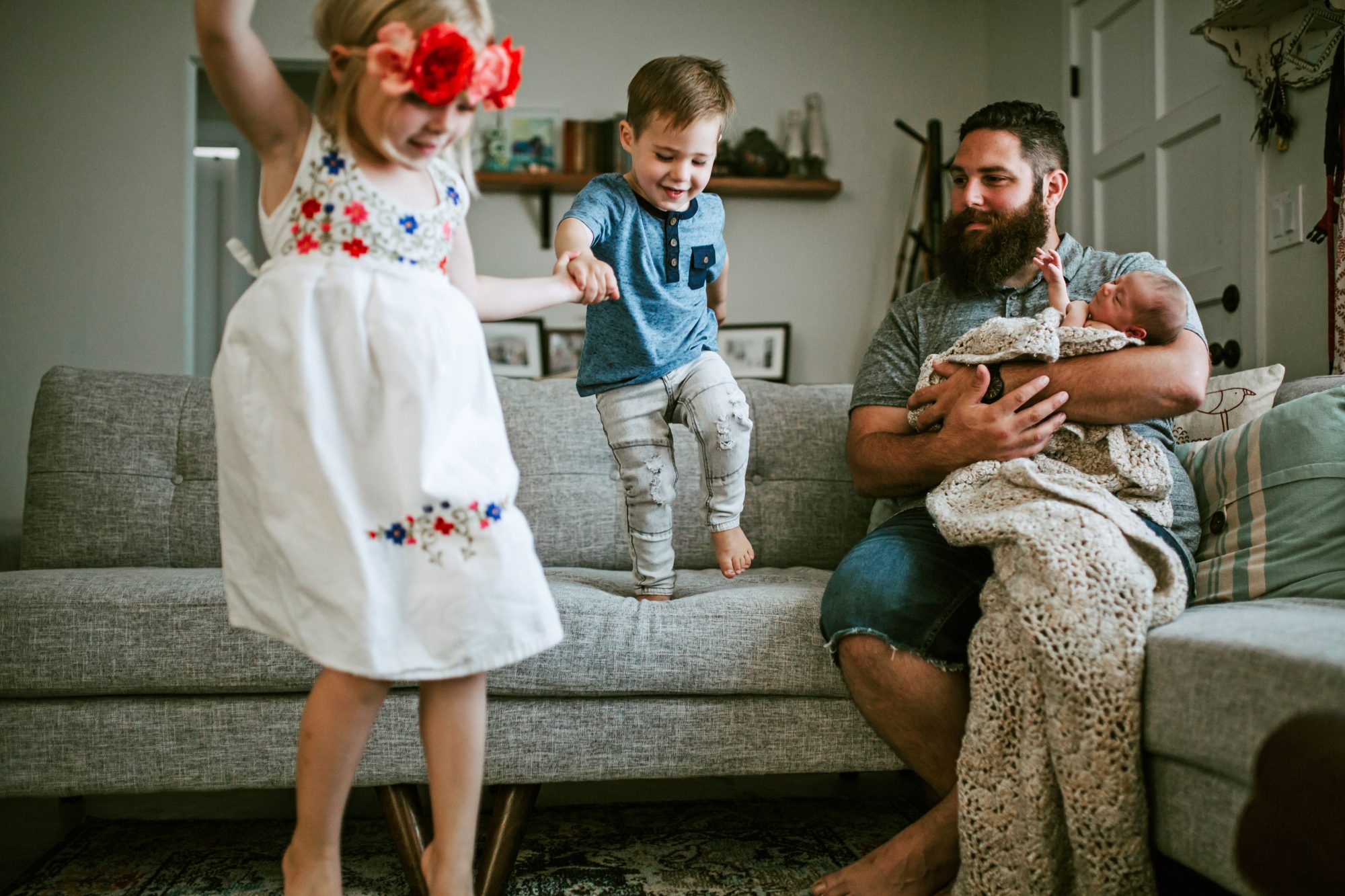
Whether caring for a newborn baby on temporary maternity leave or as a stay-at-home mother for the long term, the demands of new motherhood are immense. Often, mothers are left to face them alone, struggling to figure out how to care for a tiny human while still physically recovering from childbirth.
Even then, women are taught to be thankful for the opportunity to spend time with our babies—it's not a guarantee, after all. Due to our country's patchwork parental leave policies, the ability to take paid leave to care for a new baby depends on a variety of factors like what state you live in and what company you work for. Only 55 percent of U.S. companies offer any paid parental leave at all, and 1 in 4 women return to the workforce within 10 days of birthing a baby.
The outlook is even grimmer for fathers who wish to support their recovering partners and spend time with their young babies. Fewer companies offer paid parental leave for men than for women, and those that do often offer them less time, according to the Society for Human Resource Management.
In reality, that means that women who are able to stay home with their newborns are often doing it on their own, thrown into a world of nonstop demands, all the while expected to smile while doing it. Is it any wonder that postpartum depression and anxiety are so common?
Here's where COVID-19 comes in: Thanks to more permissive work-from-home policies to prevent the spread of the virus, many fathers and partners who would otherwise be out at the office all day are now home. And for new mothers, that means that they often have a level of support that they never could have dreamed of otherwise.
Having a baby during a global pandemic is no picnic, but it's certainly exposing more partners to the overwhelming realities of new motherhood—and for many, that's an important start.
Kicking Out the Question of “What Do You Do All Day?”
As a mother of three myself—including a baby born in August while case counts of COVID-19 soared—I've experienced the classic momentary freeze when a spouse walks in from a long day at the office to find kids crying, pets barking, everyone looking disheveled, and the house in a general state of disarray.
Like most spouses, mine has always known better than to say it, but I used to wonder if he would think it: "What did you do all day?"
The answer is one that, as veteran moms know, is almost impossible to put into words. Some days it feels like everything and nothing, but, in short, it involves a lot of tasks that are incredibly worthwhile, incredibly taxing, and typically invisible to anyone that wasn't there to see you doing them.
That's why it's such a game-changer that so many partners—including my own—are suddenly home all day to see exactly what's going on when a mother is caring for her newborn.
Wondering if it was just me who finally felt seen, I reached out to other moms of newborns from my online and in-person villages. Their concurrence and enthusiasm about having a partner at home were overwhelming, especially for veteran moms who had noticed an incredible difference in how they felt when they were taking care of their children alone compared with how they feel taking care of their "pandemic babies" now.
Liz Todd, a stay-at-home mom from Texas, is one of those moms: she has three children ages 9, 6, and 6 months. Todd says that not only is her mental health better than it was back when her first two children were babies, but she also feels like her husband finally "gets it" thanks to the fact that he's working from home.
"He has a way better sense of why 'nothing' ever gets done around the house," Todd says. "He's completely off-limits a lot of the time, but he hears the crying, the laundry beeping constantly, the dishwasher chiming when it's done, and the clanging and banging around the house as I try to balance Baby and chores."
It's the type of understanding from a partner that might eliminate or lower the need a mother feels to explain her day (which is annoying but also semi-infuriating). Or it might be enough to quell the resentment that can build between two partners when one is home all day and the other is out and about in the world seemingly as if nothing in life has changed at all. The togetherness under one household arguably builds a bond on mutual awareness and respect rather than feeling like a union is faltering in those early days.
Of her husband who works from home while she cares for the couple's 6-month-old, Elexa Goodeve, a stay-at-home mom of four from Indiana, says: "The main phrase I hear now is, 'I don't know how you do it."
Turning Understanding Into Action
As important as it is to be understood, many moms were especially excited to note that their work-from-home partners had also translated that increased understanding into action.
That was the case for Colleen Noetzli, a stay-at-home mother of a 4-year old and a 14-month-old living in Vienna, Austria. Noetzli noted that once her husband started working from home due to the pandemic, he was able to see firsthand what it looked like to take care of a newborn baby along with an older child.
While he's now back to working from the office a few days per week, he's ramped up his household contributions.
"He now starts loads of laundry before he heads into the office as a way to help out. He always takes our dog out in the morning so I can get the extra sleep. If he can sense that I've had a long day at home he offers to pick up dinner on his walk home from the train. These small shifts have made a large impact on my mental health," she says.
Work-from-home partners are also picking up more when it comes to child care. Parker Russell, CEO of Black Ink Coffee, talks about some of the ways in which he's become more involved in his 1-year-old daughter's life since he started working from home.
"Working from home allows me to stop what I'm doing to go and pick her up when she wakes up from her nap, or to give her her bottle, even just to go for a little walk in the pram outside. My wife is very well able to handle this, but I want and enjoy active participation in my daughter's life," Russell says.
Jonathan Wasserstrum, CEO of commercial real estate company SquareFoot, says that he sometimes holds his 8-month-old while he takes Zoom meetings and appreciates that his team doesn't bat an eye. "My rule since day one has been 'Baby and Mommy come first,'" he says.
Of course, having a partner working at home doesn't always equate to having a partner who is going to chip in with chores or child care or happily bounce a baby on their lap during a Zoom call. Every family and every setup is different. And with many parents out of work, strapped financially, impacted by disease, or simply trying desperately to make ends meet, times are more stressful than ever. (And if one partner is employed, it only makes sense for that job to take absolute priority even amidst the birth of a new baby.)
Plus, no matter how you slice it, being a new parent is hard. For partners, being a new parent and trying to jump back into a work-from-home job a few weeks later is also hard. And not all parents or partners can be expected to instantly step up to both gigs with 100 percent success. (That's not how parenting, partnership, or work-from-home jobs with kids work, of course.)
But the change that's being seen here comes down to exposure and simply being surrounded by the ins and outs of newborn life—something partners often miss out on due to the setup of American work life.
And this exposure alone can be eye-opening enough to inspire compassion and understanding—both of which new mothers are often in dire need of.
Keeping an Eye Out for Mental Health Challenges
In addition to time at home opening partners' eyes to the physical challenges of being with a baby, it also allows them to be more vigilant about noticing mental health challenges. Up to 1 in 7 women experience postpartum depression, according to the American Psychological Association. Amidst the COVID-19 pandemic, recent research pegs that figure as higher.
"A partner who is more present may be in a better place to recognize mental and emotional changes that a new mom may be experiencing and help her to advocate for the assistance she needs," says Megan Gray, M.D., an OB-GYN with Orlando Health Physician Associates.
Even the simple fact of having someone to talk to during the day may help to stave off some of the symptoms of more mild cases of "baby blues." The ability to check in with a partner working from home—and to take a break from baby talk and singing "The Itsy Bitsy Spider" for the tenth time in as many minutes—can do wonders for combating feelings of loneliness and isolation.
After all, maternal mental health professionals are often quick to point out that having someone else pick up on symptoms of perinatal mood and anxiety disorders (PMADs) is an important part of someone getting the help and the treatment they need when they need it.
That being said, it's also important that moms are realistic about their expectations for what a partner that's working from home will be able to do—they are, after all, still working, Dr. Gray says.
All parents should also be aware of the resources available to them (many of which are virtual), such as Postpartum Support International, and should reach out for help and support if they feel as though they or a partner are experiencing symptoms of a PMAD.
A Permanent Shift or a Fleeting Moment in History?
Dr. Gray raises an important point: Working from home is by no means a substitute for parental leave, and shouldn't be seen as such. It does, however, increase awareness of exactly why true parental leave is so important.
Men and women alike deserve the chance to bond with their babies and to provide support for each other as they make the transition to parenthood.
While nobody can predict how COVID-19 will permanently shape the workforce, it's fair to posit that even in a post-pandemic world, employers may be more willing to provide flexible working options. Whether that involves better-than-nothing work-from-home options or the more ideal option of parental leave for all parents, there's a glimmer of change on the horizon, which can sometimes be enough to inspire true change and put into place the policies that will truly help families thrive.





